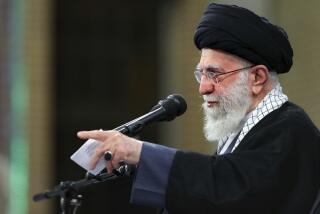Masters of muddle
- Share via
SAY WHAT YOU WILL ABOUT the mullahs who rule Iran, they are masters of obfuscation. Presented with a yes-or-no question on whether they would suspend uranium enrichment, they responded Tuesday with a 23-page masterpiece of diplomat-speak so obscure that foreign governments could initially do little more than mumble that they needed more time to figure out what it meant.
It doesn’t take a degree in Middle Eastern affairs to realize that Tehran is, as usual, stalling for time. President Mahmoud Ahmadinejad’s government hopes to so thoroughly muck up the diplomatic process that the major world powers are left without a clear-cut justification for cracking down. The U.N. Security Council has set Aug. 31 as the deadline by which Iran must agree to stop enrichment, after which the world body will consider imposing sanctions. Russia and China have been deeply reluctant to take that step, and Iran’s latest response is said to contain just enough positive language -- offering a “new formula” for further discussions -- to give them a reason to keep dithering.
Nonetheless, at least two Security Council members, the U.S. and France, aren’t buying it. On Wednesday, they said Iran’s response fell short of United Nations requirements, and the State Department announced it was meeting with allies to discuss “next moves,” presumably meaning potential sanctions. It’s well past time to do so, though there are serious questions about whether the U.N. can come up with punishments harsh enough to pose a real threat to the Iranian regime. As the Cato Institute’s Justin Logan puts it, “What’s feasible won’t work, and what might work isn’t feasible.”
The strongest blow would be a ban on the export of gasoline to Iran (which lacks refinery capacity), but leverage here is two-sided because a retaliatory cutback by Tehran on its oil exports could roil already strained markets. With oil off the table, diplomats are left mainly discussing ways to make life harder for Iran’s leaders, such as by preventing them from getting visas or freezing their foreign assets. That probably won’t be enough to persuade Tehran to end its apparent quest for nuclear weapons. Still, it would be a good first step, and it may be the maximum that Russia and China would currently accept; down the road, broader economic punishments might become more practical.
With military action out of the question for now, the international community has little choice but to continue the carrot-and-stick approach, offering Tehran economic benefits for compliance and sanctions for refusal. The challenge is to find big enough sticks.
More to Read
Sign up for Essential California
The most important California stories and recommendations in your inbox every morning.
You may occasionally receive promotional content from the Los Angeles Times.













